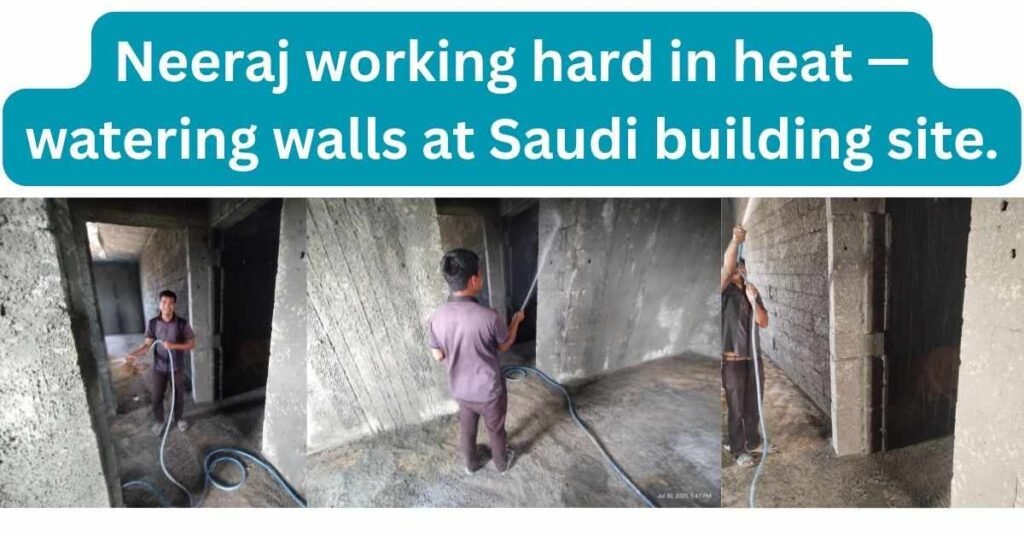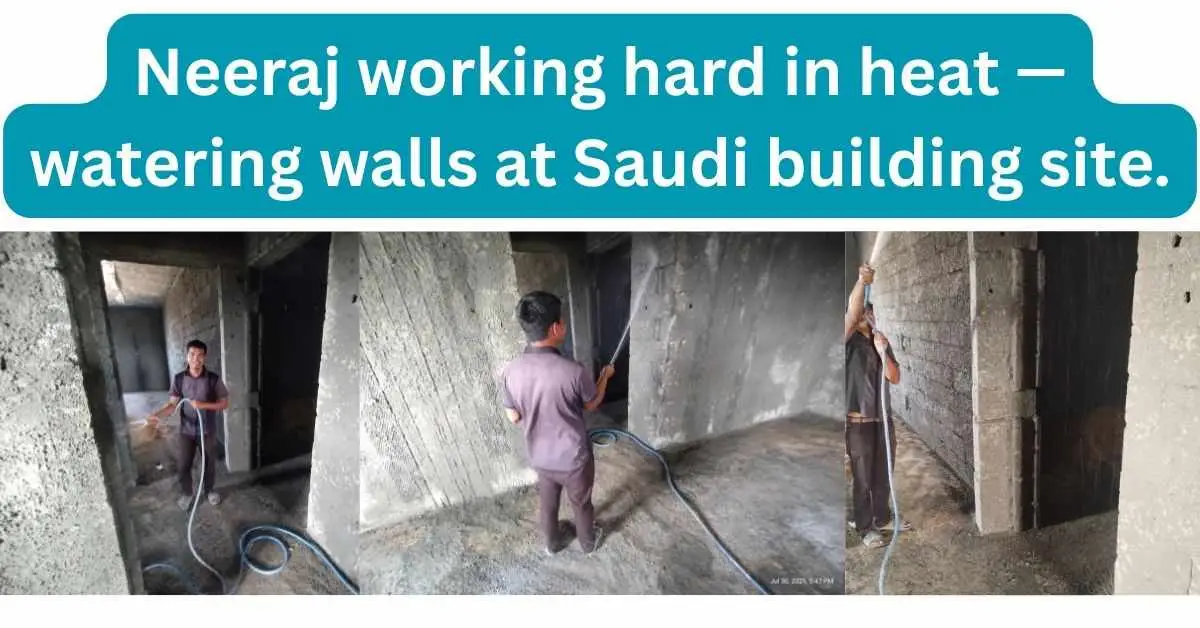![]() Written by Waqas | ⏱️ Read Time: 24 minutes | 📅 Last Updated: Aug 13, 2025
Written by Waqas | ⏱️ Read Time: 24 minutes | 📅 Last Updated: Aug 13, 2025
The Journey of Neeraj: An Indian House Driver Going to Saudi Arabia
Neeraj was a 42-year-old man from a small village in Uttar Pradesh, India. Life was not easy for him. He worked as a daily wage laborer in nearby towns, but the income was never enough to take care of his big family — his wife, two sons, three daughters, elderly parents, and many relatives who looked up to him.
How Neeraj Got His Visa
One day, a relative told him about a visa available for “house driver” in Saudi Arabia. Neeraj had never been outside India, but he knew this could change his family’s life. He contacted the local agent in the nearby city, who said:
Neeraj had driven tractors and motorcycles, so he felt confident. He paid ₹85,000 to the agent (by borrowing from friends and selling his wife’s gold bangles), and after 2 months of waiting — the visa finally arrived.
He ran back home, hugged his wife, and showed her the stamped visa. His hands were shaking with excitement and fear. It was his first step toward a different life.
Preparing for the Journey
Neeraj started preparing. He bought a new suitcase, 2 shirts, 2 pants, and some medicines. His wife cooked his favorite food daily, even though there was sadness in her eyes.
The agent booked his ticket from Delhi to Riyadh. The flight was in 12 days. Every day felt shorter now. His youngest daughter, just 6 years old, kept asking:
Neeraj didn’t know how to answer. He simply smiled and kissed her forehead.
Saying Goodbye
The night before his journey, Neeraj sat silently outside the house, looking at the sky. His mother brought him tea. His father kept blessing him with trembling hands.
His wife quietly packed his bag. His sons helped polish his shoes. The entire house was silent — no one could sleep that night.
The next morning, a taxi came to pick him up for the airport. The whole family stood outside their small house. Neeraj touched the feet of his parents, hugged his children tightly, and held his wife’s hand for the last time.
Reaching the Airport
Inside the taxi, Neeraj couldn’t stop looking back through the window until his village disappeared behind the trees. The driver kept the radio low, sensing Neeraj’s silence.
When they reached the airport gate, Neeraj looked around at the busy terminal — people rushing, announcements echoing, and trolley bags rolling everywhere.
Arrival in Saudi Arabia
The plane landed in Riyadh around 3 AM. Neeraj looked out the window — everything looked different. Roads were wider, buildings were taller, and even the air smelled new.
At the immigration counter, the officer looked at his visa and asked him a few questions. Neeraj tried to understand, mostly replying with a polite nod and the word “Driver.”
After fingerprinting and a photo, he was officially allowed into the Kingdom. He picked up his bag and walked out into the arrival area, where he saw a man standing with a placard that read:
Neeraj smiled — he already knew who that man was. It was his cousin, his khala ka beta, who had been working in Saudi for the past 4 years as a driver. Before Neeraj left India, his mama (mother) had called the cousin and told him:
So Neeraj wasn’t surprised — but he was still emotional. Seeing a known face in a foreign land gave him a little peace inside.
His cousin walked up with a smile and hugged him tightly.
Neeraj nodded, holding back his tears. He looked around once more at the bright airport lights, then quietly followed his cousin to the car.
He stepped out into the warm Saudi air, took a deep breath, and whispered:

Neeraj’s First Week in Saudi Arabia
After landing in Saudi Arabia with dreams of working as a house driver, Neeraj quickly realized that things would not begin as smoothly as he expected. As soon as he reached, his kafeel (sponsor) took his passport and told him that his iqama would take some time to process. Without an iqama, he couldn’t apply for a driving license. And without a license, he couldn’t start his duty as a driver.
So, instead of driving, Neeraj was asked to do cleaning work around the house. Every morning, he began his day by washing the kafeel’s two vehicles — cleaning them thoroughly inside and out. After that, he swept the outer area of the house, picked up fallen leaves, watered the plants, and made sure the entrance was neat and clean.
Later in the day, the kafeel would ask him to help at a nearby construction site where a new building was being constructed — possibly for the kafeel’s extended family. Neeraj’s tasks included sprinkling water on freshly plastered walls to prevent them from drying too fast, cleaning construction tools, carrying bricks, mixing cement, and doing all sorts of labour work under the hot Saudi sun. The work was physically tiring, and it wasn’t the job he had imagined when he left India. But he stayed quiet and accepted it with patience.
Language Barrier
There was also a major challenge: language. Neeraj didn’t know Arabic. He didn’t even know English. And his kafeel didn’t know Hindi. So both of them couldn’t understand each other. Instructions were given with hand signals, facial expressions, and sometimes with frustration. Many times, Neeraj stood confused, unsure of what to do.
Thankfully, Neeraj had a small support system. His cousin — his khala ka beta — who had been working in Saudi as a driver for the past few years, lived nearby. He came whenever he could to help translate between Neeraj and the kafeel. The cousin had been informed by Neeraj’s mother to receive him from the airport and keep an eye on him.
Many times, the kafeel would call Neeraj’s cousin to translate what he was saying. For example, if Neeraj didn’t understand something about cleaning or construction, the cousin would explain it in Hindi, helping him avoid mistakes and misunderstandings.
Neeraj was thankful for the help. Still, deep inside, he often felt worried. He had left his entire family behind — his wife, his two sons, three daughters, his old mother and father, relatives, and close friends. He didn’t tell them everything on the phone. He didn’t mention that he was doing labour work instead of driving. Instead, he would say, “Sab theek hai, dua karte raho,” and quickly change the topic. He didn’t want to worry them.
Evenings were quiet. He would eat alone or with his cousin, scroll through family photos on his phone, and sleep early. Though he was physically exhausted, his heart and mind stayed restless. He was just waiting for his iqama to be ready, so he could finally start the work he came for — and give his family a better future.
Iqama Process and Medical Test
After one week of hard work cleaning and helping with building, Neeraj’s kafeel started making his iqama. Iqama is very important for every expat living in Saudi Arabia. Without iqama, Neeraj cannot work as a driver or get a Saudi driving license.
First, Neeraj had to do a medical test. All expats must do this test before getting iqama. Neeraj’s cousin told him about the medical test and helped him understand.
On the test day, the kafeel took Neeraj to the medical center. Neeraj had blood test, chest X-ray, and a health check. The doctors and nurses spoke Arabic, so Neeraj could not understand much. His cousin helped by translating the instructions.
Neeraj felt a little scared but stayed calm. He knew this test was very important for his future. After the tests, they waited for some days for the result.
While waiting for his iqama, Neeraj worked temporarily as a cleaner and laborer with his kafeel.
Emotional Call to Wife
During this time, Neeraj called his wife, Suman. His voice was soft and full of hope.
This call gave Neeraj strength. He promised himself to work hard and make their life better.
When the kafeel got the medical report, he told Neeraj that the iqama application would move ahead now. This was good news for Neeraj. Soon, he will get the iqama and can apply for the driving license. Then he can start working as a driver and send money to his family.
This was a big step for Neeraj. He is slowly making his new life in Saudi Arabia as an expat, working hard and hoping for a better future.
Getting Iqama and Starting Driving License
After a few days, Neeraj’s kafeel finally gave him the iqama card. Holding it in his hands, Neeraj felt a deep relief and a little pride. He was now a legal expat in Saudi Arabia.
Without iqama, he couldn’t drive or work properly. Now, the next big step was getting a Saudi driving license. Neeraj remembered how hard it was before — no iqama, no license, no work.
This time, things started to change. Neeraj learned some simple Arabic words from his kafeel and neighbours. Though his Arabic was still very basic, it helped a lot. Now, when his kafeel spoke, Neeraj understood better, and he could reply with a few words too. They smiled often when one of them said something wrong but tried hard.
Neeraj went to a driving school, feeling nervous and excited. The instructor spoke mostly Arabic, but Neeraj tried to understand and follow. He practiced using the steering wheel carefully and learned the traffic signs.
Emotional Call to Wife
One day, after a driving lesson, Neeraj called his wife, Suman. His voice was full of emotion.
Neeraj felt stronger after this call. Every small word he learned in Arabic, every lesson he passed, brought him closer to his dream — to work as a driver, send money home, and reunite with his family.
The journey was still long, but now Neeraj felt he was not alone. He had his own strength and growing confidence to face the challenges of SaudiLife.
Every expat needs an iqama to legally live and work in Saudi Arabia. Neeraj was waiting for his to be processed by his kafeel.
First Month, First Salary, and Family Call
A month passed since Neeraj started working in Saudi Arabia. It was a long month filled with learning and hard work. Finally, Neeraj got his first salary. Holding the money in his hand, he felt very happy and proud.
But there was a problem — he could not send the money to his family yet. Neeraj did not have a bank account in Saudi Arabia, so the salary stayed with him.
Despite this, Neeraj was thankful because his kafeel was good and gave his salary on time. This made Neeraj trust his sponsor and feel safe in this new country.
That evening, Neeraj called his whole family. His voice was filled with joy and relief.
His family was very happy to hear his voice. They wished him luck and told him to take care.
Neeraj promised himself to open a bank account soon and send money to support his wife, children, parents, and relatives. This was just the beginning of his SaudiLife journey.
Driving License, Bank Account, and First Money Transfer
A few days later, Neeraj finally got his Saudi driving license. He passed the test with confidence. Holding the license card in his hands, he felt like a real driver now — officially ready to do the work he came for.
Around the same time, his kafeel helped him open a bank account in Al Rajhi Bank. It was not easy, but with his iqama and new license, the process became smooth.
Neeraj wasted no time. As soon as the account was active, he went to a nearby money transfer shop and sent his first salary to his family in India.
He was smiling the whole day. It was his first step toward fulfilling the promises he made to his wife Suman, his sons, his daughters, and his parents.
That evening, he called home again. His voice was full of excitement.
Suman was so happy that her eyes filled with tears. The children cheered in the background. Everyone felt proud of Neeraj and thanked him for his hard work.
Got His SIM Card – A Small but Big Step
After getting his iqama and bank account, Neeraj felt more settled in his new Saudi life. One more thing was still missing — a SIM card on his own name.
Till now, he was using his cousin’s old SIM temporarily, but it was not registered under his iqama.
One evening, his kafeel took him to a Mobily store. The staff checked his iqama and activated a new SIM card under his name.
Neeraj felt a strange happiness. A small thing like a SIM card — but it made him feel like he truly belonged here now.
She called immediately, her voice excited, “Neeraj! Ye number tumhara hai?”
It was just a phone number, but for Neeraj, it was a symbol of his growing independence in a foreign land.
Neeraj finally got his Mobily SIM card after receiving his iqama. It made him feel more connected to the Saudi world and his family back home.
House Driver Duty and One Year Completed – Neeraj’s Saudi Life Journey
Finally, after weeks of waiting, Neeraj’s official duty as a house driver began.
His kafeel handed him the car keys and said, “From today, you will drive my family.”
Neeraj was a little nervous at first, but he had been practicing. He checked the car carefully — cleaned it from inside and outside, adjusted the mirrors, and started his new role with full responsibility.
His daily duties included dropping the kids to school, taking madam for shopping or to hospital appointments, and sometimes picking up groceries or guests.
He always kept the car neat and was never late.
Slowly, the family started trusting him more. The madam would speak kindly and respectfully to him — even asking if he had eaten or needed rest.
Time passed quickly, and one year completed.
Neeraj’s kafeel was a good man. Sometimes he gave Neeraj extra money as a bonus for his hard work. The madam also appreciated him and gave him tips from time to time as a gesture of kindness.
With this extra income, Neeraj started to build a small house in his village back in India. Every brick was a dream coming true — a better home for his family.
Every evening, when he returned from duty, he felt satisfied. He was finally doing what he came here for — a real job, with respect and routine.
His life was going smooth now. His kafeel treated him fairly, gave him food, and his room was clean and comfortable.
Neeraj still missed his family every night — but he was now hopeful. He had adjusted to the Saudi life as an expat. Things were falling into place.
After Two Years – Preparing for Exit Re-entry
After two years of hard work and living his new life in Saudi Arabia, Neeraj was preparing for his first exit re-entry visa.
This visa would allow him to visit India for a short time and then return to Saudi Arabia to continue working.
Neeraj felt mixed emotions — happiness to see his family again and a little nervousness about the travel process.
He talked with his kafeel, who helped him with the visa papers and ticket arrangements.
His kafeel gave him simple tasks like washing cars, cleaning the house’s outer area, and later helping at a construction site. Neeraj followed instructions even though he couldn’t speak Arabic well.
Neeraj was excited but also thankful for everything he had achieved in his Saudi life journey so far.
A Step Closer to Home
Neeraj stood at the airport, suitcase in hand, ready to fly home after two years away.
He thought about all the hard days and long nights he had faced, the lessons learned, and the progress made.
Though he missed his family deeply, he felt proud of the life he was building for them from afar.
This trip home was a chance to rest, reconnect, and recharge.
Neeraj knew that after this visit, he would return to Saudi Arabia with new strength and hope.
His journey as an expat was far from over — it was just another step on the path to a better future for his loved ones.


